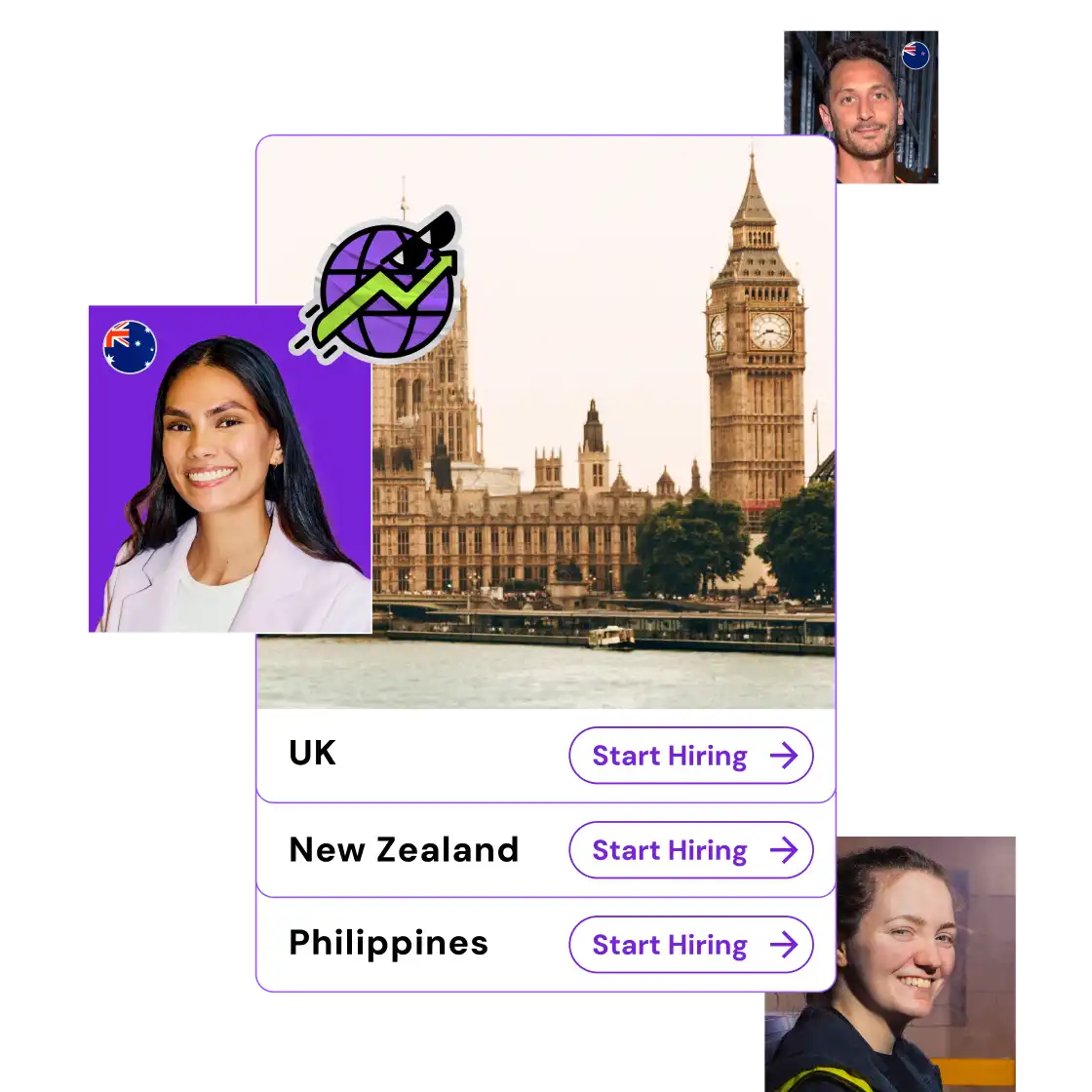Hire Employees in Singapore
Looking to hire employees in Singapore? HeroForce is your Employer of Record, helping you find and hire the skills you need.
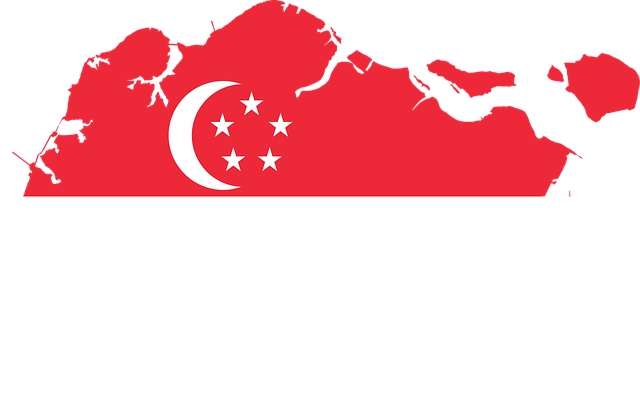
Key Facts
| Employment Terms | |
|---|---|
| Timezone | GMT +8 |
| Currency | Singapore Dollar (SGD) |
| Capital city | Singapore |
| Official language(s) | English, Malay, Mandarin and Tamil |
| Ease of doing business | Very friendly to business (#2 out of 190) |
| Minimum wage | There is no minimum wage in Singapore (with few exceptions) |
| Estimated employer cost | 17 – 17.25% |
| Employer retirement contribution: Central Provident Fund (CPF) | As an employer, you’re required to contribute to the Central Provident Fund (CPF) for your employees who are Singapore Citizens or Singapore Permanent Residents. CPF covers contributions to Retirement, government healthcare and social housing. The contribution rates for employers are:
|
About Singapore
The Republic of Singapore is a developed city-state located in Southeast Asia. With a population of around 5.4 million, it has the second highest GDP (PPP) per capita in the world. Its diverse population is also very educated, ranking high in most international education rankings (PISA, QS ranking, …).
Singapore’s employment landscape is governed by the comprehensive Employment Act, which provides flexibility to employers to manage the employment relationship with the employee.
Employment in Singapore
Working Hours
- Work in Singapore is 40 hours per week for a 5-day work week. The law authorises a maximum of 44 hours a week for a 5-day work week, up to 9 hours per day. If the work week is longer than 5 days, the maximum of hours per week remain at 44 hours, but there is a maximum of 8 hours of work per day.
Overtime
- An employer can request that an employee works reasonable overtime within the limits of 44 hours per week. For non-manual workers, overtime is commonly factored into the salary package, and no additional payments are required for any additional hours worked.
Probationary Period
- Employers determine the length of probation, which varies depending on the nature of the business and the role. 3 or 6 month probationary periods are common.
Payroll Cycle
- Employees need to be paid at least once a month, within 7 days of the end of the salary period.
Main Types of Leave in Singapore
Annual Leave
Minimum Statutory requirement is 7 days per year, with one extra day per year of service, up to 14 days. However, it is customary to provide at least 14 days to 22 days per year, depending on responsibilities.
Sick Leave
14 days of paid outpatient sick leave.
60 days of paid hospitalisation leave, inclusive of the 14 days sick leave.
Eligibility starts gradually after 3 months of service, and is full after 6 months of service.
*The employer can request for a Medical Certificate (MC).
Parental Leave
Maternity Leave
Maternity leave can range from 12 weeks to 16 weeks of leave, for employees with more than 3 months of service. Reimbursement of 8 to 16 weeks of wages is possible via the Government-Paid Maternity Leave scheme (GPML), depending on eligibility (nationality of child, number of children) and capped at SGD 10,000 per 28 days.
Paternity Leave
The child’s father is entitled to 2 weeks of paid leave if:
- The child is a Singapore citizen
- The father is married to the child’s mother (except for adoption)
- The father has more than 3 months of service
Other Leave
National Service Leave – Employers are required to grant a leave of absence to Singaporean Citizens & permanent residents called for national service duty (periods going from a few days to a maximum of 40 days per year).
*The employer will be able to claim reimbursement of wages during that period from MINDEF.
Childcare Leave – Parents are eligible to 2 to 6 days of childcare leave or extended childcare leave if:
- Their child is under 12 years old
- The employee has more than 3 months of service
*The employer can claim partial reimbursement from MSF subject to conditions.
Employment Termination
Notice Period
Notice periods are typically set in the contract between 1 and 3 months. If the employment contract didn’t specify it, then the notice period will depend on the length of service:
- 1 day notice for less than 26 weeks of employment
- 1 week notice for employees who have been employed more than 26 weeks and less than 2 years
- 2 weeks’ notice for employment of more than 2 years and less than 5 years
- 4 weeks’ notice for over 5 years of employment
Within probationary periods notice periods are normally not required, or reduced to 1 week.
Termination
As long as a due notice has been given, no reason for termination needs to be given. Terminations without notice are possible in the event of employee misconduct or breach of employment terms, such as continuous absence from work without informing the employer.
As an employer, you must provide a written termination letter to the employee.
We recommend that you seek professional advice before taking any action on termination.
Severance
In cases of retrenchments, there are no legal minimum requirements, but the norm in Singapore is to provide between 2 weeks to 1 month of salary per year of service to employees who have more than 2 years of service.
For those with a shorter length of service, any retrenchment benefit would be granted out of goodwill.
Disclaimer: The information on this webpage is current as at 19 September 2022, and has been prepared by Employment Hero Pty Ltd (ABN 11 160 047 709) and its related bodies corporate (Employment Hero). The views expressed on this webpage are general information only, are provided in good faith to assist employers and their employees, and should not be relied on as professional advice. The information is based on data supplied by third parties. While such data is believed to be accurate, it has not been independently verified and no warranties are given that it is complete, accurate, up to date or fit for the purpose for which it is required. Employment Hero does not accept responsibility for any inaccuracy in such data and is not liable for any loss or damages arising either directly or indirectly as a result of reliance on, use of or inability to use any information provided on this webpage. You should undertake your own research and to seek professional advice before making any decisions or relying on the information displayed here.
Download the International Hiring Guide
*Information here is current as at 16/09/2022, for full details download the guide.
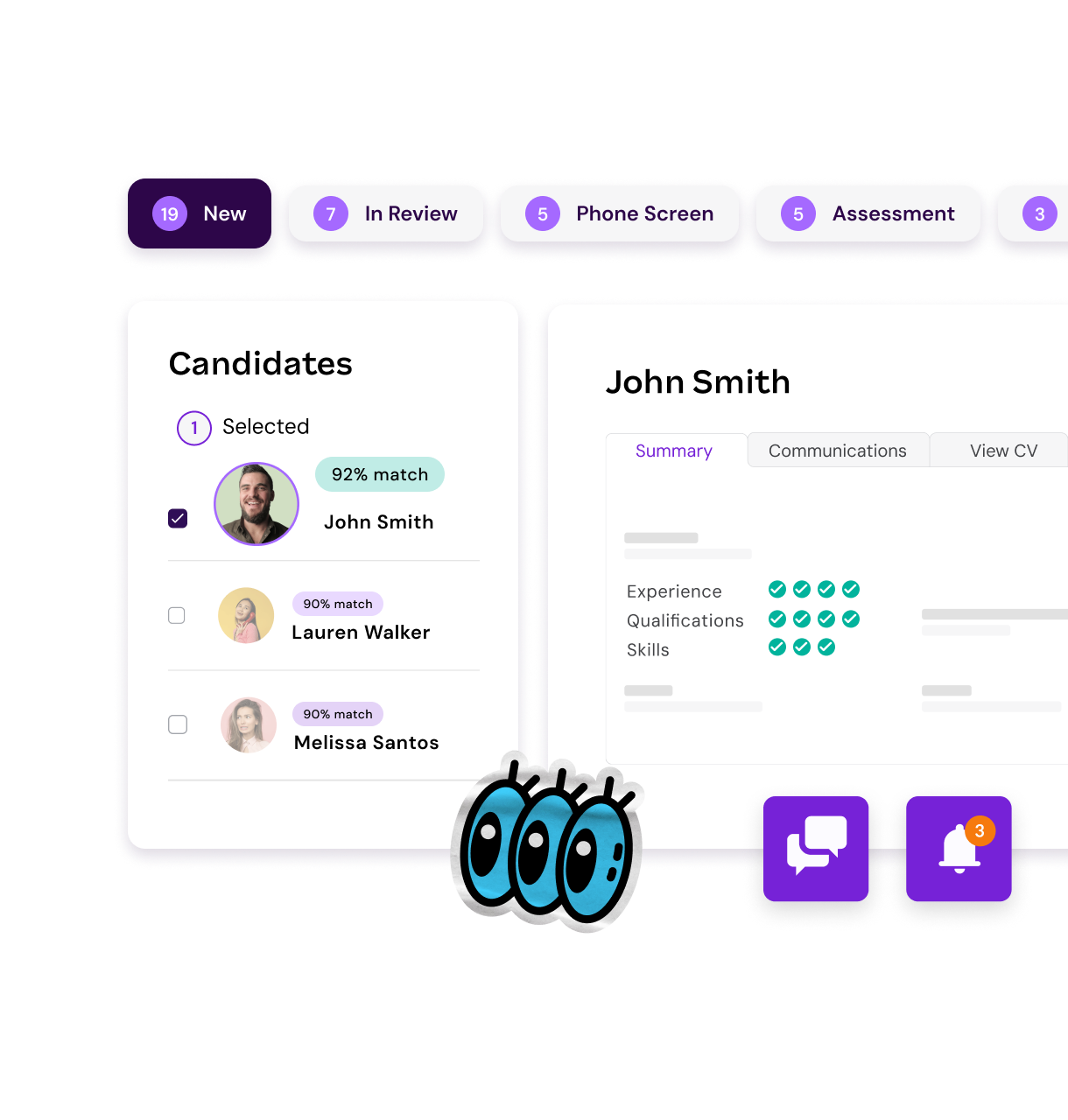
Hiring Process in Singapore
Sorted.
Hiring an employee in Singapore is no easy task. Especially, if you are overseas, and lack the knowledge of employment law and regulations relating to international HR compliance, payroll, benefits and taxes.
Employment Hero has a local entity Singapore and we fully understand all the ins and outs of hiring in the local market, so we can help you throughout the step-by-step process.
Singapore Employment Law Decoded.
Singapore has laws that help keep workplaces fair. You should be aware of the rules and what your employer’s rights and responsibilities are. Under Singaporean employment law, employers and employees both have rights and responsibilities. Do you know your responsibilities?
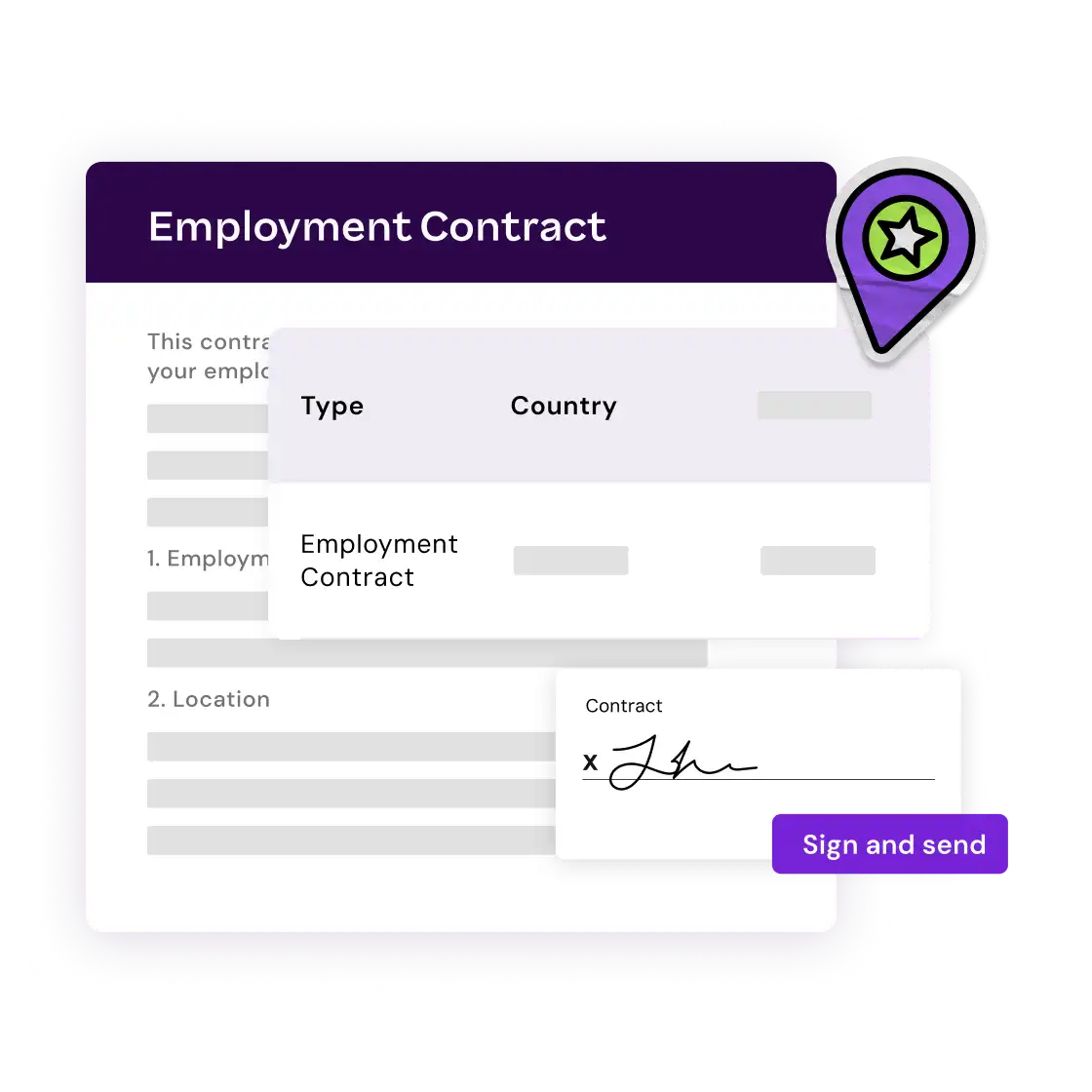
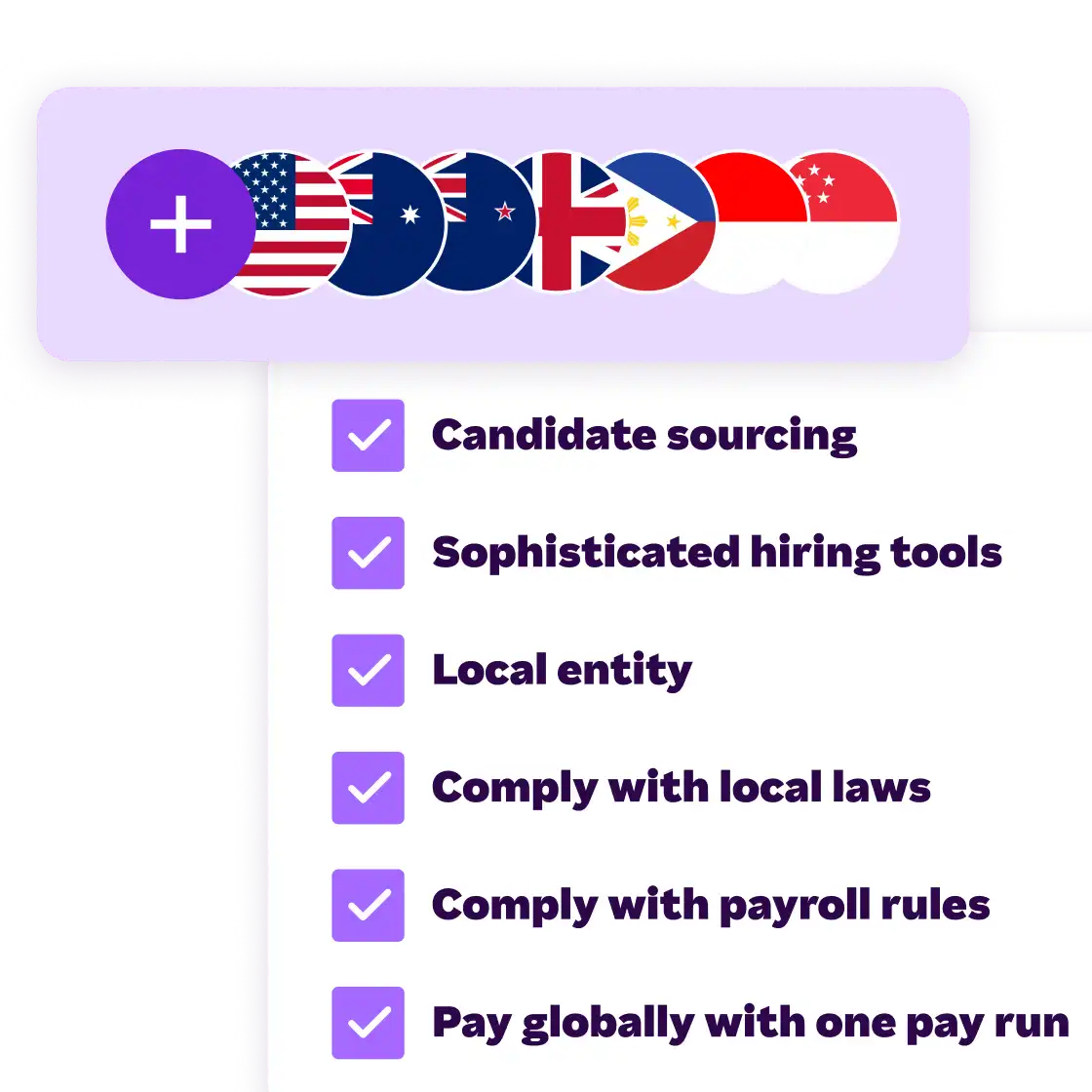
Employ anyone, anywhere. Easily.
HeroForce takes care of the complex admin; international employment legislation, local tax and pension minimums, insurance obligations and more. Hiring incredible talent from anywhere in the world has never been easier.
Try our Applicant Tracking System
Employment Hero’s ATS makes hiring and managing new staff easier than ever.

“The good thing about Employment Hero is that they’re on this journey with you… We’ve got a kind of partnership helping us understand local employment and ensure we’re hiring legally.”
Ariane Sarabia, Global Talent Acquisition Specialist

Related Resources
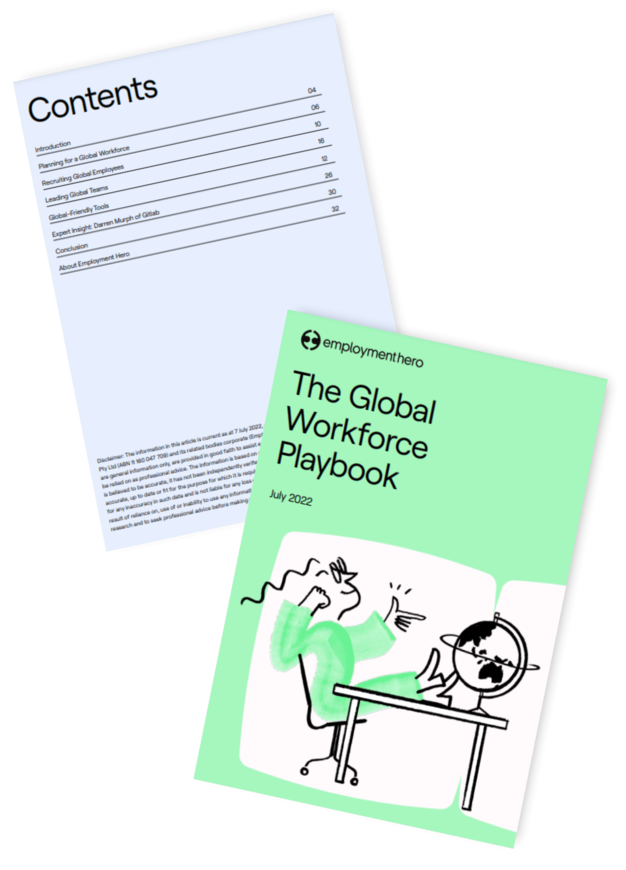
The Global Workforce Playbook For Employers
Are you ready to go global? We explore how SMBs can establish dynamic and effective global teams.
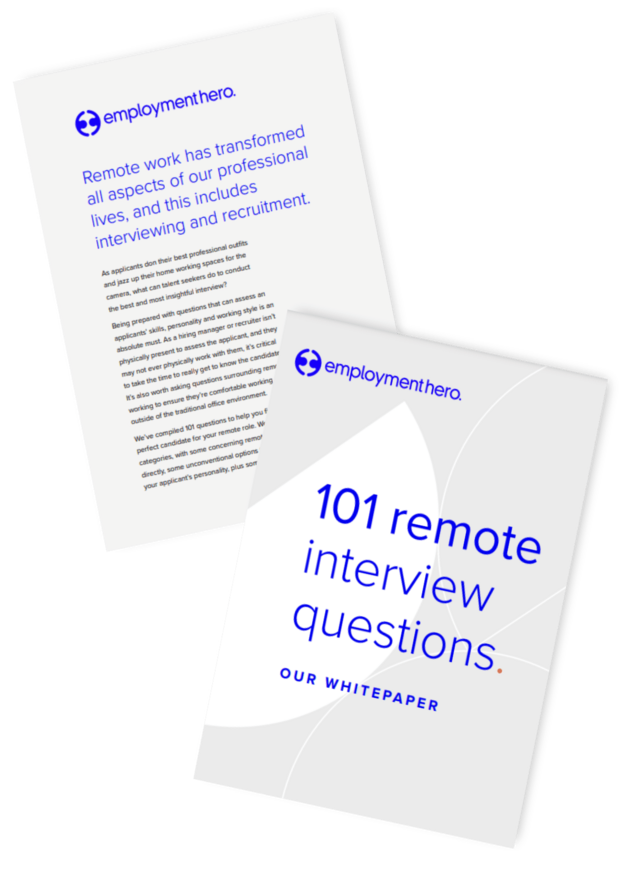
Interview Questions To Ask Remote Workers
We’ve compiled 101 questions to help you find the best talent for your remote role.
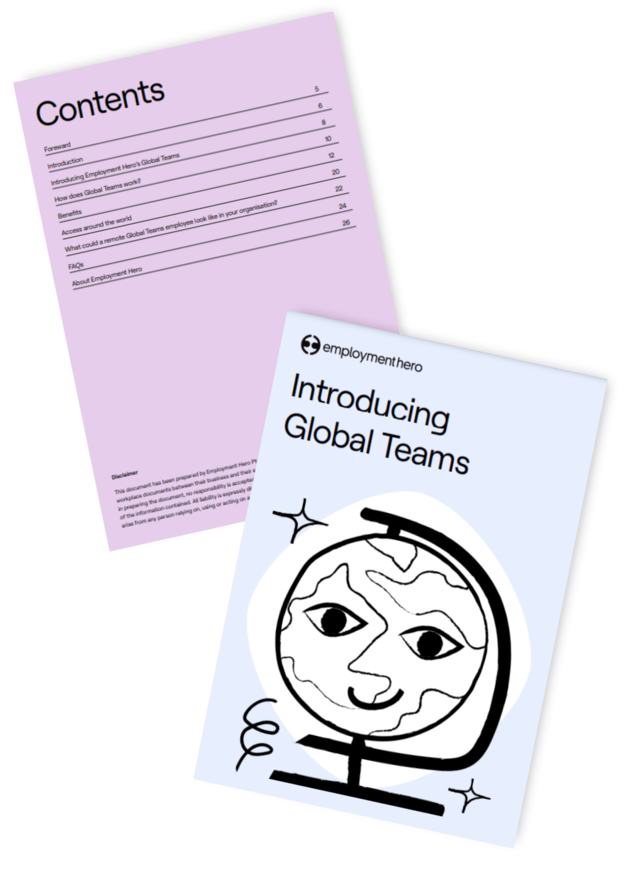
How global teams can transform your business
Global teams are changing the workplace. Find out how this team structure can benefit your business
Employer of Record.
Hire Remotely
HeroForce EoR is the best-in-class global (EOR) Employer of Record that enables you to hire based on skill, not location. Whether you’re expanding into new markets or struggling to fill open roles, we connect the best talent with the best employers, legally and ethically.
